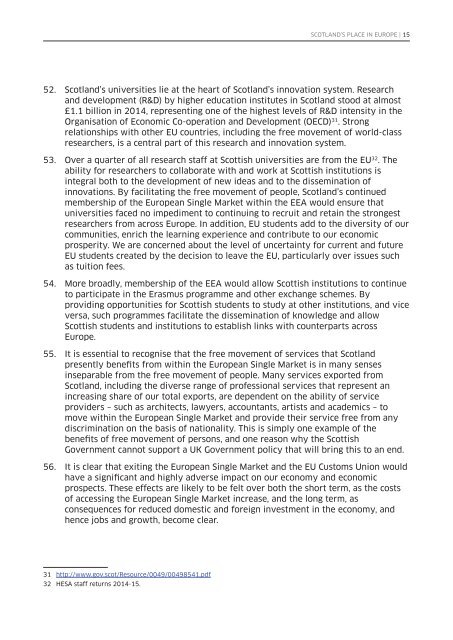Scotland’s Place in Europe
5tSyKxiOE
5tSyKxiOE
Create successful ePaper yourself
Turn your PDF publications into a flip-book with our unique Google optimized e-Paper software.
SCOTLAND’S PLACE IN EUROPE | 15<br />
52. <strong>Scotland’s</strong> universities lie at the heart of <strong>Scotland’s</strong> <strong>in</strong>novation system. Research<br />
and development (R&D) by higher education <strong>in</strong>stitutes <strong>in</strong> Scotland stood at almost<br />
£1.1 billion <strong>in</strong> 2014, represent<strong>in</strong>g one of the highest levels of R&D <strong>in</strong>tensity <strong>in</strong> the<br />
Organisation of Economic Co-operation and Development (OECD) 31 . Strong<br />
relationships with other EU countries, <strong>in</strong>clud<strong>in</strong>g the free movement of world-class<br />
researchers, is a central part of this research and <strong>in</strong>novation system.<br />
53. Over a quarter of all research staff at Scottish universities are from the EU 32 . The<br />
ability for researchers to collaborate with and work at Scottish <strong>in</strong>stitutions is<br />
<strong>in</strong>tegral both to the development of new ideas and to the dissem<strong>in</strong>ation of<br />
<strong>in</strong>novations. By facilitat<strong>in</strong>g the free movement of people, <strong>Scotland’s</strong> cont<strong>in</strong>ued<br />
membership of the <strong>Europe</strong>an S<strong>in</strong>gle Market with<strong>in</strong> the EEA would ensure that<br />
universities faced no impediment to cont<strong>in</strong>u<strong>in</strong>g to recruit and reta<strong>in</strong> the strongest<br />
researchers from across <strong>Europe</strong>. In addition, EU students add to the diversity of our<br />
communities, enrich the learn<strong>in</strong>g experience and contribute to our economic<br />
prosperity. We are concerned about the level of uncerta<strong>in</strong>ty for current and future<br />
EU students created by the decision to leave the EU, particularly over issues such<br />
as tuition fees.<br />
54. More broadly, membership of the EEA would allow Scottish <strong>in</strong>stitutions to cont<strong>in</strong>ue<br />
to participate <strong>in</strong> the Erasmus programme and other exchange schemes. By<br />
provid<strong>in</strong>g opportunities for Scottish students to study at other <strong>in</strong>stitutions, and vice<br />
versa, such programmes facilitate the dissem<strong>in</strong>ation of knowledge and allow<br />
Scottish students and <strong>in</strong>stitutions to establish l<strong>in</strong>ks with counterparts across<br />
<strong>Europe</strong>.<br />
55. It is essential to recognise that the free movement of services that Scotland<br />
presently benefits from with<strong>in</strong> the <strong>Europe</strong>an S<strong>in</strong>gle Market is <strong>in</strong> many senses<br />
<strong>in</strong>separable from the free movement of people. Many services exported from<br />
Scotland, <strong>in</strong>clud<strong>in</strong>g the diverse range of professional services that represent an<br />
<strong>in</strong>creas<strong>in</strong>g share of our total exports, are dependent on the ability of service<br />
providers – such as architects, lawyers, accountants, artists and academics – to<br />
move with<strong>in</strong> the <strong>Europe</strong>an S<strong>in</strong>gle Market and provide their service free from any<br />
discrim<strong>in</strong>ation on the basis of nationality. This is simply one example of the<br />
benefits of free movement of persons, and one reason why the Scottish<br />
Government cannot support a UK Government policy that will br<strong>in</strong>g this to an end.<br />
56. It is clear that exit<strong>in</strong>g the <strong>Europe</strong>an S<strong>in</strong>gle Market and the EU Customs Union would<br />
have a significant and highly adverse impact on our economy and economic<br />
prospects. These effects are likely to be felt over both the short term, as the costs<br />
of access<strong>in</strong>g the <strong>Europe</strong>an S<strong>in</strong>gle Market <strong>in</strong>crease, and the long term, as<br />
consequences for reduced domestic and foreign <strong>in</strong>vestment <strong>in</strong> the economy, and<br />
hence jobs and growth, become clear.<br />
31 http://www.gov.scot/Resource/0049/00498541.pdf<br />
32 HESA staff returns 2014-15.


